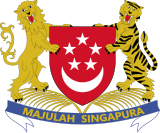Our website is made possible by displaying online advertisements to our visitors.
Please consider supporting us by disabling your ad blocker.
Supreme Court of Singapore
| Supreme Court of Singapore | |
|---|---|
 The new Supreme Court Building opened in 2005, designed by Norman Foster | |
 | |
| 1°17′26″N 103°51′2″E / 1.29056°N 103.85056°E | |
| Established | 9 January 1970[1] |
| Coordinates | 1°17′26″N 103°51′2″E / 1.29056°N 103.85056°E |
| Composition method | Executive selection |
| Authorised by | Constitution of Singapore |
| Judge term length | Tenure until the age of 65, but may be re-appointed |
| Website | www.supremecourt.gov.sg |
| Chief Justice of Singapore | |
| Currently | Sundaresh Menon |
| Since | 6 November 2012 |
| Supreme Court of Singapore | |||||||
|---|---|---|---|---|---|---|---|
| Chinese name | |||||||
| Chinese | 新加坡最高法院 | ||||||
| |||||||
| Malay name | |||||||
| Malay | Mahkamah Agung Singapura | ||||||
| Tamil name | |||||||
| Tamil | சிங்கப்பூர் உச்சநீதிமன்றம் | ||||||
| This article is part of a series on |
 |
|---|
|
|
The Supreme Court of Singapore is a set of courts in Singapore, comprising the Court of Appeal and the High Court. It hears both civil and criminal matters. The Court of Appeal hears both civil and criminal appeals from the High Court. The Court of Appeal may also decide a point of law reserved for its decision by the High Court, as well as any point of law of public interest arising in the course of an appeal from a court subordinate to the High Court, which has been reserved by the High Court for decision of the Court of Appeal.
The High Court's jurisdiction is as follows: generally, a civil case is commenced in the High Court if the subject matter of the claim exceeds S$250,000. Probate matters are dealt with in the High Court if the value of the estate exceeds S$3 million or if the case involves the resealing of a foreign grant. In addition, ancillary matters in family proceedings involving assets of S$1.5 million or above are heard in the High Court.
Criminal cases involving offences which carry the death penalty and generally those punishable with imprisonment for a term exceeding ten years, are prosecuted in the High Court. Non-bailable offences are generally tried in the High Court. As a rule of thumb, the High Court in Singapore has inherent jurisdiction to try all matters within Singapore.
- ^ The date of commencement of the Supreme Court of Judicature Act 1969 (No. 24 of 1969), now the Supreme Court of Judicature Act (Cap. 322, 2007 Rev. Ed.).
Previous Page Next Page


